BASIS International & Bilingual Schools China places great emphasis on professional development. Along with dedicated Professional Development days, there are also weekly sessions focused on divisional meetings, pedagogical discussions, and training.
At BASIS Bilingual Kindergarten Futian (BKFT) a recent professional development (PD) session centered on an essential question: “What is Play?” We explored this fundamental aspect of Early Childhood Education, delving into the deeper meaning of play, how we define it at BASIS, and its implications for our practice.
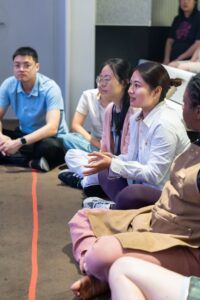
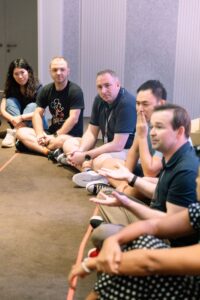
Opening with Inspiration
We began our session by watching the powerful video poem “The Little Boy” by Helen E. Buckley, a thought-provoking piece that set the stage for reflecting on how we as educators teach young children and how this can affect their habits and thinking. In the poem, a young boy goes to school filled with excitement, but with each activity and day, his knowledge, skills, and creativity are gradually shut down through constant direct instruction and the phrase, “Wait, I’ll show you how.” By the end, the boy has lost his ability to think creatively, and when he moves to a new school, he is only able to wait for exact instructions.
Circle Time: A Pedagogical Reflection
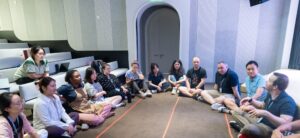
After watching the video, I asked the teachers to sit on the floor, mirroring the experience we create for our students by sitting in a circle. We engaged in a conversation where questions arose naturally from our responses. We discussed the poem and how play is often misunderstood and underutilized in ECE educational settings. It sparked questions and ideas, setting a reflective tone for our discussion. Here are some of the key insights that merged from these open and dynamic conversations:
1. Rethinking Learning Blocks

Our discussion evolved into how we structure learning throughout the day. Whole group instruction certainly has its place, but it’s not the only way. We emphasized the power of “free-flow play” where children can explore provocations in a well-provisioned environment. These provocations, thoughtfully designed and open-ended, invite children to engage with materials and ideas in their own way, promoting deeper learning and inquiry that connect to our themes of discovery, “I can” statements and other interests.
2. Our Role as Educators
We reflected on how our responses to children and the way we arrange the flow of the day can directly impact their thinking and behavior. When we create a day full of opportunities for exploration and movement, we support cognitive development and emotional regulation. By considering how our routines and transitions feel to the children, we can make adjustments that foster creativity, independence, and collaboration.
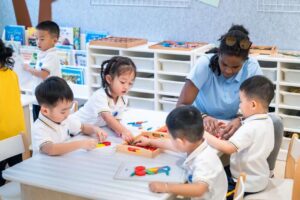
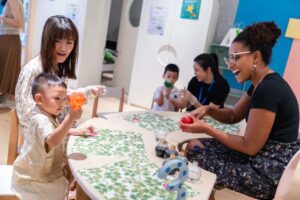
3. Movement Matters
Sitting “nicely” in one place for too long can be challenging–not just for children but for adults too. We realized that after 15 minutes of sitting together, we were all fidgeting and itching to move. This physical discomfort served as a reminder: children need to move! Whole group time should focus on short, engaging, and purposeful activities. When we prioritize quality over quantity, we not only respect children’s physical needs but also enhance their ability to stay present and engaged.
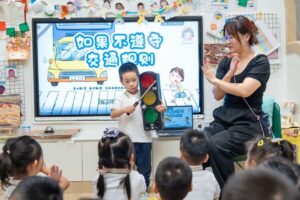
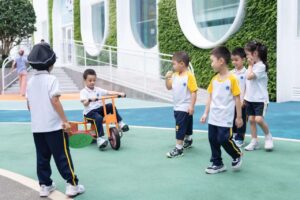
A Shift in Perspective
This session underscored a core truth about play: it’s not just a break from learning–it is learning! Play cannot be defined by one activity versus another but rather by the engagement and interest of the players. By incorporating movement, exploration, and autonomy into our days, we are not only making learning more enjoyable but also more effective by allowing students to develop a range of skills.
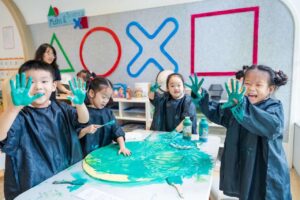
As we continue to evolve in our teaching practices, BASIS International & Bilingual Schools hold to an essential truth: improve, not prove. Our goal as schools, administrators, and teachers is to continuously improve in what we do and how we do it, making our educational environments continuously evolving and of the highest quality from early childhood to high school.
About the Author

Joshua Barr has been working in China and Early Childhood Education since 2010. He has an MA in Education Leadership and Management, as well as an M.Ed in Globalized Education. He first joined the BASIS International & Bilingual Schools network in 2016 at BASIS International School Shenzhen as an ECE Subject Expert Teacher. In 2023 he joined BASIS Bilingual School Shenzhen as Head of ECE and in 2024 he became the Head of Kindergarten for the standalone ECE campus BASIS Bilingual Kindergarten Futian.
Watch the recording of our live webinar about teaching at BASIS Bilingual Kindergarten Futian on our YouTube channel.
For more information about teaching abroad with BASIS International Schools, visit our careers website.